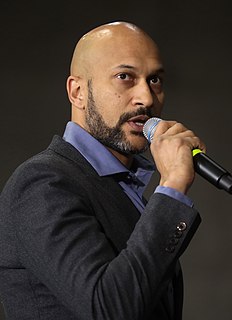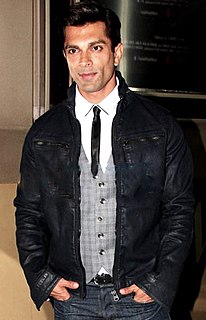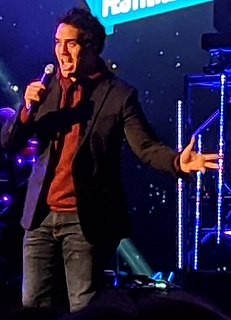A Quote by Sterling K. Brown
My character [in This Is Us], Randall, was adopted. He'd never met either of his biological parents so he seeks out and finds his biological father after 36 years. So that's where we find my character at the beginning of the show.
Related Quotes
In the four years since the inspectors left, intelligence reports show that Saddam Hussein has worked to rebuild his chemical and biological weapon stock, his missile delivery capability, and his nuclear program. He has also given aid, comfort, and sanctuary to terrorists, including al Qaeda members... It is clear, however, that if left unchecked, Saddam Hussein will continue to increase his capacity to wage biological and chemical warfare, and will keep trying to develop nuclear weapons.
At the time, I used to say, "We should market this like Everybody Loves Raymond. It's just a guy dealing with his family." Instead, it was irresistible to show all these funny people. So, I actually think this could be more inviting to a new audience because they can just watch one character, find out what's going on in his life, and then meet another character and find out what's going on in her life, and then see how it intersects the other one.
Depending on the year or the therapist he was seeing, he'd learned to ascribe just about every facet of his character as a psychological reaction to his parents' fighting: his laziness, his overachieving, his tendency to isolate, his tendency to seduce, his hypochondria, his sense of invulnerability, his self-loathing, his narcissism.
That song [ "Proud of your boy" ] in particular, I sing towards the beginning of the show [Aladdin], and what it does is show his wants and needs at the beginning and what's motivating him and carry it throughout the show. It gives him layers and dimensions. He's a well rounded character and it's great.
Conceit of the anti-gay law in Russia is to protect children, then the people who have the most to fear are LGBT parents. And sure enough, in conjunction with the homosexual propaganda law, they instituted a ban on adoptions by same-sex couples, or single people from countries where same-sex marriage is legal. That has very scary potential for any LGBT person with adopted kids, because Russian courts practice this particular legal concept called "annulment of adoption." So an adopted child is never exactly the same as a biological child, even if he or she was adopted ten years ago.
It is a fascinating fact that father and son have given the most striking evidence for the apparently contradictory properties of the electron: the father proving its character as a particle, the son its character as a wave... Thomson was extremely proud of his son's success and tried to assimilate the new results into his old convictions.




































